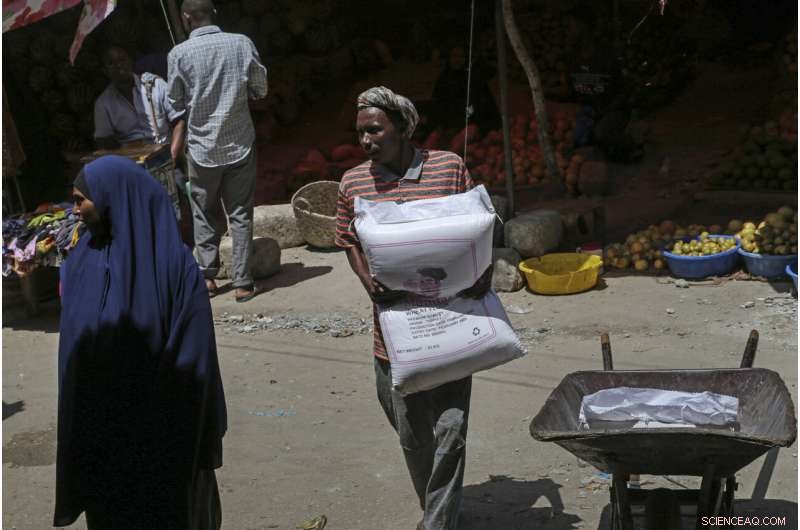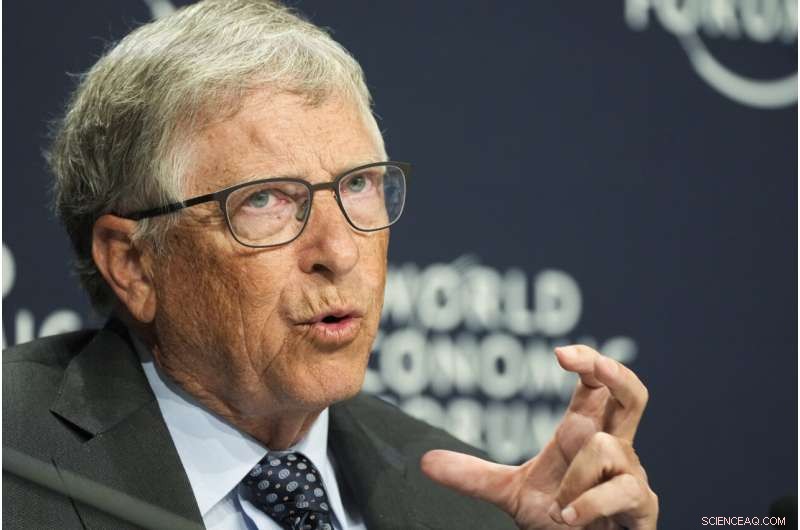
Um homem carrega um saco de farinha de trigo importado da Turquia no mercado Hamar-Weyne na capital Mogadíscio, Somália, quinta-feira, 26 de maio de 2022. Bill Gates pediu aos líderes mundiais que não desistam das metas que estabeleceram para reduzir a fome e a pobreza, apesar enormes contratempos recentes documentados em um novo relatório divulgado terça-feira, 13 de setembro pela Fundação Bill e Melinda Gates. Crédito:AP Photo/Farah Abdi Warsameh, Arquivo
Bill Gates diz que a crise global da fome é tão imensa que a ajuda alimentar não pode resolver completamente o problema. O que também é necessário, argumenta Gates, são os tipos de inovações em tecnologia agrícola que ele financiou há muito tempo para tentar reverter a crise documentada em um relatório divulgado na terça-feira pela Fundação Bill e Melinda Gates.
Gates aponta, em particular, para um avanço que ele chama de "sementes mágicas", culturas projetadas para se adaptar às mudanças climáticas e resistir a pragas agrícolas. A Fundação Gates também divulgou na terça-feira um mapa que modela como as mudanças climáticas provavelmente afetarão as condições de cultivo de culturas em vários países para destacar a necessidade urgente de ação.
Ao atribuir à tecnologia um papel preeminente no enfrentamento da crise alimentar mundial, Gates se coloca em desacordo com os críticos que dizem que suas ideias entram em conflito com os esforços mundiais para proteger o meio ambiente. Eles observam que essas sementes geralmente precisam de pesticidas e fertilizantes à base de combustíveis fósseis para crescer.
Os críticos também afirmam que a abordagem de Gates não aborda a urgência da crise. O desenvolvimento de "sementes mágicas" leva anos e não trará alívio imediato a países que atualmente enfrentam sofrimento generalizado porque dependem de importações de alimentos ou estão passando por secas históricas.
É um debate que pode intensificar a pressão internacional para cumprir as metas compartilhadas de prosperidade e paz globais, conhecidas como Objetivos de Desenvolvimento Sustentável da ONU, antes do prazo de 2030. Os 17 objetivos incluem acabar com a pobreza e a fome, combater as mudanças climáticas, fornecer acesso à água potável, trabalhar pela igualdade de gênero e reduzir a desigualdade econômica.
"É bastante sombrio em relação às nossas esperanças para 2030", disse Gates, 66 anos, em entrevista à Associated Press. Ele acrescentou, no entanto, "Estou otimista de que podemos voltar aos trilhos".
Gates apontou a guerra na Ucrânia e a pandemia como as principais causas do agravamento da crise da fome. Mas sua mensagem para outros doadores e líderes mundiais reunidos para a Assembleia Geral da ONU em setembro é que a ajuda alimentar não será suficiente.
"É bom que as pessoas queiram evitar que seus semelhantes passem fome quando conflitos como a Ucrânia interrompem o fornecimento de alimentos", escreve Gates no novo relatório. Mas o verdadeiro problema, diz ele, é que muitos países com insegurança alimentar não produzem o suficiente de seus próprios alimentos – um problema que certamente será exacerbado pelas consequências das mudanças climáticas.
"A temperatura continua subindo", disse Gates. "Não há como, sem inovação, chegar nem perto de alimentar a África. Quer dizer, simplesmente não funciona."
Como tem feito há mais de 15 anos, Gates pediu investimento em pesquisa agrícola, destacando sementes de milho que prosperam em temperaturas mais altas e em condições mais secas do que outras variedades. Essas sementes foram desenvolvidas no âmbito de um programa da Fundação Africana de Tecnologia Agrícola, à qual a fundação doou US$ 131 milhões desde 2008.
Desde então, a Fundação Gates gastou US$ 1,5 bilhão em doações focadas na agricultura na África, de acordo com a Candid, uma organização sem fins lucrativos que pesquisa doações filantrópicas. A Fundação Bill e Melinda Gates é, de certa forma, a maior fundação privada do mundo e é mais conhecida por seu trabalho em saúde global, incluindo vacinas. Começou em sua forma atual em 2000, depois que Gates deixou seu cargo de CEO na Microsoft, a gigante de tecnologia que ele cofundou. A Forbes estima que seu patrimônio líquido seja de cerca de US$ 129 bilhões.
Os gastos da fundação com o desenvolvimento agrícola é o motivo pelo qual a visão de Gates sobre como os países devem responder à insegurança alimentar ganhou maior importância em um ano em que um recorde de 345 milhões de pessoas em todo o mundo estão com fome aguda. O Programa Mundial de Alimentos disse em julho que a contagem representa um aumento de 25% em relação a antes da Rússia invadir a Ucrânia em fevereiro e um salto de 150% em relação a antes da pandemia na primavera de 2020.
In Ghana, field trials for four varieties of modified seeds began in 2013. But only this past summer has one been approved for commercialization, said Joeva Rock of the University of Cambridge. Activists there, she said, have asked whether those resources could have been better spent elsewhere.
"What would happen if those went into increasing funds to the national research centers in Ghana, to building roads, to building storage, to building silos or helping to build markets?" said Rock, who has written a book about food sovereignty in the country.
When asked, Gates acknowledged the importance of infrastructure like roads and other transportation systems.
"If you want your inputs like fertilizer to come in, if you want your output to go out, it's just too expensive in Africa without that infrastructure," he said, adding that building and maintaining roads is highly expensive.

Bill Gates, Co-Chair, Bill &Melinda Gates Foundation, speaks at a news conference during the World Economic Forum in Davos, Switzerland, Wednesday, May 25, 2022. Gates urged world leaders not to give up on the goals they set to reduce hunger and poverty despite huge recent setbacks documented in a new report released Tuesday, Sept. 13 by The Bill and Melinda Gates Foundation. Credit:AP Photo/Markus Schreiber, File
Some researchers question the wisdom of pursuing the fundamental premise that Gates has embraced:Increasing agricultural production through the use of modified seeds along with fertilizers and pesticides. They point to the environmental footprint of industrial agriculture, including the use of fossil fuel-based fertilizers, the degradation of soil quality and the diminishing of biodiversity.
Alternatives could include agroecological interventions, like developing locally managed seed banks, composting systems to promote soil health and pesticide interventions that don't rely on chemicals, experts said. Over time, those approaches can reduce the need for food aid and build more resilient farming systems, according to Rachel Bezner Kerr, a professor of global development at Cornell University.
Kerr, a lead author of the food chapter of the latest report from the International Panel on Climate Change, said that while the panel doesn't make recommendations, "overall, the kind of focus on a few technologies and reliance on fossil fuel-based inputs isn't in line with ecosystem-based adaptation" or a biodiverse future.
Mark Suzman, CEO of the Gates Foundation, defends its approach warning that limiting access to fertilizers means farmers cannot increase their yields.
"Fertilizer is necessary. You simply cannot meet the overall productivity gains without it," Suzman said, speaking on a call with reporters.
In his interview with the AP, Gates himself dismissed criticisms of the foundation's emphasis on modified seeds.
"If there's some non-innovation solution, you know, like singing 'Kumbaya,' I'll put money behind it," Gates said. "But if you don't have those seeds, the numbers just don't work." He added, "If somebody says we're ignoring some solution, I don't think they're looking at what we're doing."
Another project the foundation has funded is the development of computer models that try to measure crop loss caused by disease or pests. The idea is to direct research and responses to where they are needed most.
"It's not just, how do we get through this crisis and get back to normal? It's, what does the future normal look like?" said Cambria Finegold, the director of digital development for CABI, an intergovernmental nonprofit that is developing the models.
Melinda French Gates, the other co-chair of the Gates Foundation, highlighted in a separate letter the halting progress toward gender equity worldwide. Since January, the foundation has expanded its board, adding six new members to help direct its work, a move that followed the announcement of the Gateses' divorce last summer.
French Gates has agreed to step down after two years if the two decided they could not continue to work together. French Gates, who also founded an investment organization called Pivotal Ventures, was not available for an interview.
Gates said he is lucky that his former wife has continued to put her time and energy into the foundation. In July, Gates said he would contribute $20 billion to the foundation in response to the significant setbacks caused by the pandemic, raising its endowment to approximately $70 billion.
Through his giving, investments and public speaking, Gates has held the spotlight in recent years, especially on the topics of vaccines and climate change. But he has also been the subject of conspiracy theories that play off his role as a developer of new technologies and his place among the highest echelons of the wealthy and powerful.
Gates said he does not spend time thinking about conspiracies and that his foundation's work has nothing to do with his personal reputation.
"If you go into these countries, they've never heard of me or the foundation," Gates said. "Maybe in the rich world somebody is reading some internet thing, but the people we care about have never, will never, and it's not important that they ever know who I am."
+ Explorar mais Gates:Foundation to invest $5B in Africa over next 5 years
© 2022 The Associated Press. Todos os direitos reservados. Este material não pode ser publicado, transmitido, reescrito ou redistribuído sem permissão.

